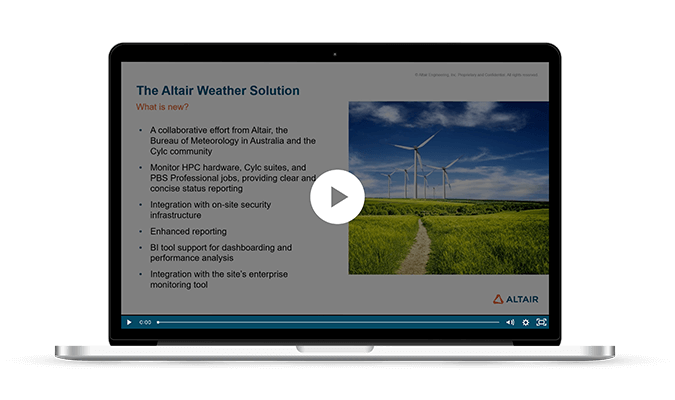
Weather and Climate
Weather and climate centers worldwide rely on the power of high-performance computing (HPC), and Altair keeps HPC running reliably and efficiently. Because modeling the Earth’s weather and climate is a challenge, it requires powerful HPC systems and software that can orchestrate the most complex workloads. Fields such as climate modeling and numerical weather forecasting have global economic and social impact.

Weather and Climate Modeling
Altair computing solutions power major weather centers all over the world. Where time is always a critical factor and results have significant real-world impact, our high-performance computing (HPC) workload orchestration, resource management, user access, and analytics solutions ensure weather and climate modeling and simulation workloads run quickly and efficiently and maximize HPC resources.
How can we help you optimize your weather modeling and simulation?
Contact Us
PBS Professional and the Cylc Workflow Engine
Cylc is an open-source workflow engine for cycling systems that handles a range of workflow complexities. It automatically executes tasks according to detailed schedules and dependencies, and it’s especially useful in areas such as weather and climate modeling, numerical weather prediction, physics simulation, and data processing.
Cylc has become a popular choice at major weather and climate centers around the world — and now it’s a key tool at Australia's Bureau of Meteorology. Cylc was originally developed for operational environmental forecasting at NIWA, the National Institute of Water and Atmospheric Research in New Zealand, and now it’s an open-source collaboration between NIWA, the Met Office (UK), the Center of Excellence for Weather and Climate Simulation in Europe (ESiWACE), the Bureau of Meteorology, and other contributors.
Altair, NIWA, and the Bureau of Meteorology developed a production environment for monitoring the performance of many Cylc workflows along with Altair® PBS Professional®, our industry-leading workload manager and job scheduler for HPC and cloud environments. Altair provides commercial support for the community-based Cylc workflow engine.

The Altair Weather Solution
Altair’s weather solution is built on the PBS Professional workload manager for HPC and cloud environments, combined with the Cylc workflow engine. The solution lets users monitor HPC hardware, Cylc suites, and PBS Professional jobs, and it provides clear and concise status reporting. Purpose-built for the complex workloads of climate modeling and prediction, the Altair weather solution was designed to be modular, comes ready for easy, out-of-the-box deployment and includes:
- Message Viewer: View into Cylc and PBS Professional messages
- Event Inspector: Insight into system events
- Message Modifier: For development and support
- Schedule Prediction Tool: Visual representation of the workflow schedule
Featured Resources

Sustainability and Climate Protection Through Digitalization
How to choose the right material, the right design, and the right process to develop solutions that minimize carbon emissions and bolster your bottom line.
A step-by-step guide for transforming your plastics engineering value chain to develop solutions that optimize performance, minimize carbon emissions, and gain a competitive edge.
What you will learn:
- Material selection and testing to minimize carbon emissions with Global Warming Potential evaluations alongside traditional performance and cost metrics
- A step-by-step simulation-driven approach to accelerate design space creation, explore variants, and better optimize lightweight plastic parts
- Ways to predict and prevent critical problems such as injection mold core fractures or failures to optimize production operations
- Improve manufacturability using multiscale material modeling
- How to gain a competitive edge with faster time to market through first-time-right injection molding methods, simulation and rapid variant analyses to optimize part, mold and parameters for manufacturing

HPC in Weather and Climate
Weather and climate centers worldwide rely on the power of high-performance computing (HPC) to track, analyze, simulate and predict the behavior of weather systems, climate patterns and other atmospheric phenomena. In this roundtable, experts from leading weather and climate centers across the globe will detail how they harness HPC to fuel this critically important research.
Topics will include:?
- Advanced workload orchestration to optimize resource utilization and accelerate research timelines?
- Maintaining critical uptime: alerting, support and redundancy measures?
- Storage and I/O optimization to manage massive data volumes?
- Machine learning and artificial intelligence to accelerate simulation timelines and improve prediction

Predicting Global Weather & Climate - New NCAR HPC System Expected to Achieve Over 3x Faster Performance
HPC systems at NCAR power the science behind global weather and climate prediction and research. In early 2021, NCAR announced that their Cheyenne supercomputer, located at the NCAR-Wyoming Supercomputing Center, will be replaced by a new HPE Cray EX system with 3.5x more processing power, up to 19.87 petaflops with a combination of CPU and GPU nodes. The new system will include efficient workload management and scheduling by Altair PBS Professional and Altair Accelerator Plus.

Job Scheduling on NCAR's Next-generation Supercomputer
Computational and Information Systems Laboratory (CISL) supports and advances this research in the geosciences with the world-class HPC and high-performance storage.
For workload management and resource scheduling, NCAR uses Altair PBS Professional to exploit features like cloud bursting, fairshare, power-user and maintenance reservations, resource assignment with control groups, high-throughput hierarchical scheduling, green provisioning, and energy-aware scheduling.
This presentation by Irfan Elahi, Brian Vanderwende, and John Blaas from the National Center for Atmospheric Research (NCAR) was aired during the 2021 Altair HPC Summit, and is about 29 minutes long.


